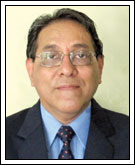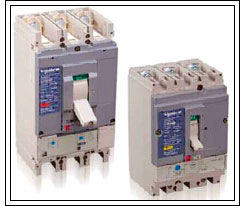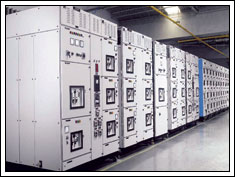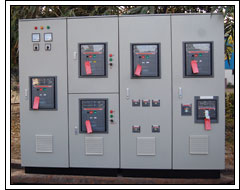 —Soeb Fatehi, President, Control Panel & Switchgear Manufacturers’ Association (COSMA)
—Soeb Fatehi, President, Control Panel & Switchgear Manufacturers’ Association (COSMA)
COSMA completes 25 years of service to the control panel and switchgear industry this year. At this landmark juncture,
Soeb Fatehi takes us through various contours of the industry – the trials, tribulations and the vast opportunities. Fatehi also outlines COSMA’s priorities in furthering the cause of its vast and diverse membership. Our small and medium manufacturers require better sharing of knowledge to remain contemporary, notes Fatehi. An interview by
Venugopal Pillai.
Take us through the current distribution of COSMA membership.
Our Control Panel & Switchgear Manufacturers’ Association (COSMA) is now 25 years old. This is our Silver Jubilee Year in service of the trade. We have members spread across the land with a major concentration of membership in the western and southern part of the country. The east is represented by membership from Assam and in the north we have members in the NCR. In addition to our manufacturer members, we have associate members who trade in or produce switchgear and components that go into the manufacture of control panels and switchgear. Our members are mainly drawn from the low voltage product segment.
 Despite being a critical component of the power distribution chain, we feel that switchgear and control panels manufacturers do not get the attention and importance that they deserve. What is your view?
Despite being a critical component of the power distribution chain, we feel that switchgear and control panels manufacturers do not get the attention and importance that they deserve. What is your view?
Attention and importance are very subjective terms. Since the products manufactured by our members are capital equipment used in switching and control of electrical energy, the general non-technical public does not get exposed to the same. These are not fast moving consumer appliances that are widely advertised and directly used or operated by the public. Therefore it is not unusual that these goods are not on the frontline of attention. However every architect, consultant, service provider and premises or plant owner is aware of the crucial importance of our products.
From what you have said in earlier interactions, most control panel manufacturers do not follow business practices that are usually seen in larger corporate entities. This leads to stifling of their growth. Please elaborate.
More than half of the control panel producing industry, in India, is part of the thriving MSME sector of the country. It is neither possible nor necessary for MSMEs to follow the same practices as followed by various corporate entities. Furthermore many initiatives to improve productivity and quality have centred on a few practices directly downloaded from European and Japanese companies. Such attempts have failed to make an impact. Small and medium businesses in India are generally owner-managed companies. Change management fails and the owners’ intentions are suspected to be the reason for failure. However two things are missing in the approach adopted by most practitioners who lead such initiatives.
One is the acumen to understand geographical nuances and localize the practices and processes. The other is the ability to first prepare the ground for change by taking the owners, managers and employees along together by answering the, “what’s in it for me?” question. The latter requires empathy in the process to bring alignment in the answer to “what’s in it for me?” for all the individual stakeholders. Business owners generally being highly talented technocrats, frequently take a little time to appreciate that not every layer in the organization is populated with people less talented than themselves. The notion that “they” need to change whereas “we are just fine as we are” compounds the complexity of the task at hand. COSMA is willing to help businesses of members to grow by creating awareness of the tools available and also inviting experts to guide those that wish to use the support.
 All the same, do you see distinct signs of at least a section of the control panel manufacturers trying to rediscover their style of operations and break away from the “conservative” mode?
All the same, do you see distinct signs of at least a section of the control panel manufacturers trying to rediscover their style of operations and break away from the “conservative” mode?
Many manufacturers have now brought in the second and third generation of the family into the business. This has resulted in new skill sets and contemporary attitudes entering the workplace. Also, concerned customers invest in vendor talent and resource development, making it possible for manufacturers to access the highest process and technical knowledge bases while working for such customers. Training of vendors regularly takes place. When businessmen see the value created by modifying their approach, they willingly step forward to accelerate their own development and growth.
You have had very strong views about lack of standardization in the control panel industry. Please elaborate on the most prominent systemic shortcomings.
Standardization in its many aspects, I shall refer to now. Product standardization by design and construction, to become repeatable, builds consistency in quality and lowers the cost to the consumer in an exceedingly competitive market. Standardization leads to waste elimination in engineering and prototyping processes while also reducing the element of trial and error. Sometimes small manufacturers are not immediately convinced when they have to spend slightly higher costs on materials, till they see the benefits of saving in time and other resources come through.
By “standardization” many refer to conformity to prevalent Standards and Codes. This too is weak in India. The cost of compliance is not correctly positioned in the comparison of costs by buyers and sellers alike. Small and medium businesses are not able to support the costs of certification (or even the cost of third party testing for validation and verification) and the buyers are not willing to factor it as part of the cost of reliability. Accounting standards and practice are centred on tax incentives as a generator of profits; thereby, the lifecycle costs including the cost of safety and reliability are ignored as also the costs of consequential damages. On conformity with standards and codes, one more hurdle is the slowness in adoption of IEC codes / acceptance of global norms. This leads to Indian manufacturers being slow to compete on international trade in commodities like control panels. The advantages of flexibility of small scale of manufacture are lost when otherwise good products fail to conform.
Indian manufacturers of switchboards are still producing as per the IS 8623 standard whereas the world has moved through IEC 60439 into IEC 61439 now. The distinction between standards for control panels one hand and Switchboards (PCCs) on the other is required to be driven home. Our small and medium manufacturers require better sharing of knowledge to remain contemporary. This is a thrust area of COSMA and I wish future officers of COSMA push harder.
 Do you see difference in operational efficiency between control panel makers who manufacture their own switchgear and those who source it from others?
Do you see difference in operational efficiency between control panel makers who manufacture their own switchgear and those who source it from others?
Very few manufacturers of control panels (switchboards) manufacture their own switchgear components. The large majority in the small and medium sector don’t.
The large players, who make both switchgear and switchboards, achieve high efficiency in operations through fewer options. Manufacturers, who reserve to use a variety of switchgear, end up doing engineering and detailing for many options. They also invest in tooling and fixtures for a diversity of their range of produce. This also leads to an escalation in lead time for design and production. However they bring home the advantage of being agile by their flexibility and satisfy their customer through higher customization. They build tailor made assemblies as a “special case” every time!
Tell us more about how “system houses” of leading switchgear makers function. Do system houses, due to their close working relations with reputed companies, exhibit more efficiency in their working?
System integrators, design licencees and franchise partners enjoy the benefits of high technology access in products and processes. They are better trained to deliver quality. However in a price sensitive market they are not able to reap the same profits as they would from their own products.
What is the overall import dependence in the switchgear and control panel industry? What impact has the weakening rupee had so far?
Import dependence is reasonably high. Alongside full switchgear products, many components are imported. Raw materials are also imported in many cases. Indirect dependence also extends to imports of machinery for manufacturing and tooling. The weakening of the Rupee comes as a setback in the ability of the industry to keep commitments on firm price orders. Where new prices apply, budgeted costs have to be extended leading to slowing of execution of projects.
 We understand that the switchgear and control panel industry suffers from lack of technically skilled manpower. What is your view? Does the current engineering curriculum regard control panel as a specialized stream?
We understand that the switchgear and control panel industry suffers from lack of technically skilled manpower. What is your view? Does the current engineering curriculum regard control panel as a specialized stream?
I believe that this is a serious concern for all manufacturing industry in India. The shortage of skilled persons and the employability of persons coming out from institutes pose a serious challenge. Unfortunately little is being done by both academia and industry except complaining and lamenting. While being president of COSMA, I am also on various committees of Bombay Management Association. We have created special focus task cells there to build bridges between academia and industry. We shall be focusing on upgrade of faculty skill-sets and providing of co-curricular and extra-curricular platforms for students to enhance their capabilities. We have little control over curriculum and syllabus upgrade because the same are under regulatory boards and councils administered by various government departments.
Our Chairman Emeritus Shri Satish Kazi works intimately on education initiatives right from primary school to university in his personal capacity and alongside many NGOs. He also earnestly solicits support all around for setting up training programs for industry and trade. My recent interactions with young graduates have left me with a desire to extend support to bright graduates and diploma holders to hone their skills and increase their usefulness for industry.
As President of COSMA, what are currently your topmost priorities?
Naturally, for an organization in its 25th year, our focus will have to be on sustainability – for COSMA – by presupposing sustainability for constituent member businesses. To accomplish this we are increasing our efforts in the areas of education and knowledge sharing. We align with IEEMA and other organizations to create opportunities for increased interaction across the entire electrical industry. Finally we invite all members of the electrical and electronics manufacturing industry to join us in increasing the quality of interaction with all users of electricity.